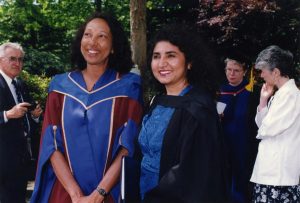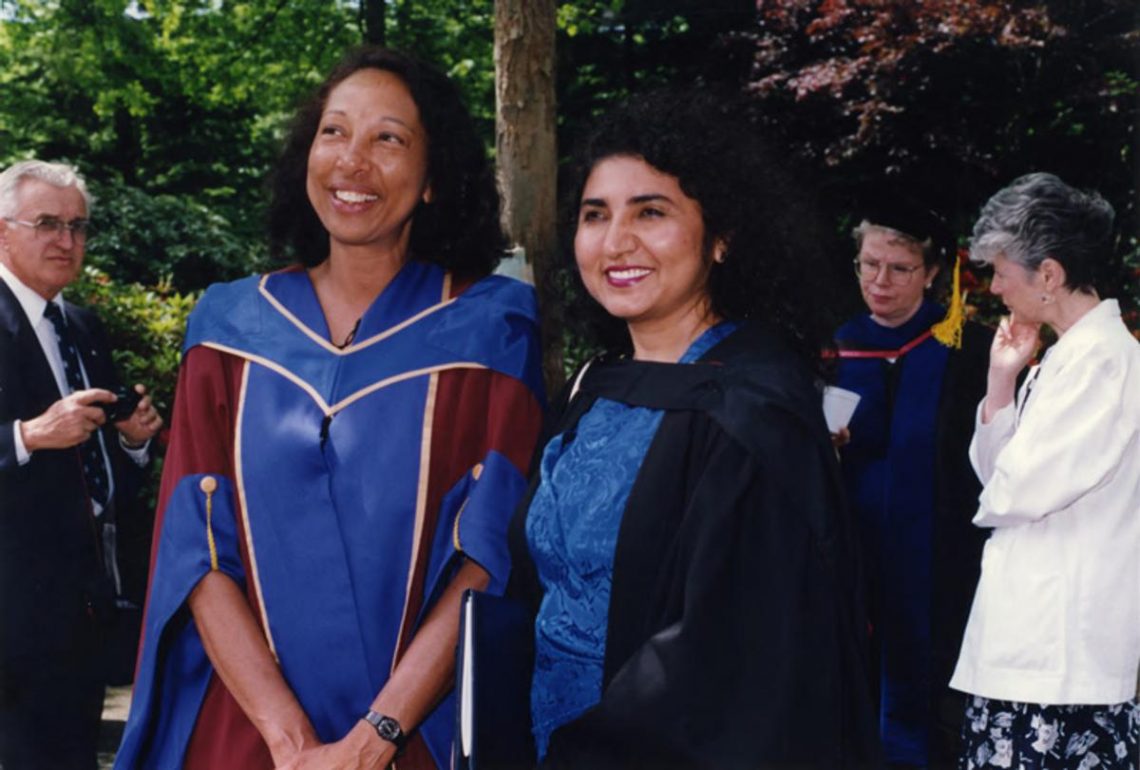Joan Anderson: One of UBC’s “Treasures”

Dr. Joan Anderson’s life’s work catalyzed the ‘critical’ turn in nursing scholarship. The UBC School of Nursing’s international reputation as a hub for excellence
in critically-oriented research and scholarship is directly attributable to Dr. Anderson’s trailblazing research program, and her sustained commitment to the highest quality of doctoral-level training for the next generation of nursing and health researchers.
Dr. Anderson completed her PhD in Sociology in 1981, having attained an MSN at UBC and a BN at McGill University. A member of the UBC Nursing faculty for 30 years, she also held Visiting Professorships at Harvard Medical School Department of Social Medicine and Health Policy, the University of Toronto, Loughborough University, England, and the University of Melbourne School of Nursing, among others.
Over the course of her remarkable career, she has drawn upon her education as both a nurse and a sociologist to engage with various social science and nursing theories to foster critical scholarship in nursing and health sciences. Dr. Anderson’s program of research evolved in response to Canada’s changing immigration policies in the 1980s, and the demands of practice to provide competent care to patients from diverse backgrounds. As the field of critical scholarship grows and evolves, Dr. Anderson continues to keep abreast of different ‘paradigm shifts’ to examine the ways in which they might inform nursing science, and strengthen the theory, research, and practice dialectic.
Dr. Anderson’s leadership was instrumental in UBC’s development of one of Canada’s first doctoral programs in nursing. As Chair of the PhD in Nursing Planning Committee at UBC from 1984-1991, Dr. Anderson convincingly articulated the case for doctoral studies within the discipline, building the faculty research base upon which a viable proposal could be developed, and leading the development of UBC’s PhD program proposal through to Senate approval and program launch in 1991.
In 1987, with her former graduate student Judith Lynam, Dr. Anderson established the Cultural Studies and Health Research Unit (CSHRU) at the School of Nursing. The CSHRU philosophy at the time reflected the pioneering research program that was the hallmark of Dr. Anderson’s life’s work:
“The consortium of scholars associated with the Cultural Studies and Health Research Unit is engaged in critical inquiry drawing upon the traditions of postcolonialism, feminism, and cultural studies. Common themes of inquiry built upon in the Unit center around social justice, inequities in access to health and health care services, and vulnerabilities as structured by various socially constructed classifications such as gender, race, and class, and by certain life transitions (e.g., aging, hospitalization)” (CSHRU Philosophy statement, 1987).

In 2004, Dr. Anderson led the transition of the CSHRU to become the Culture, Gender and Health Research Unit, to focus on “critical inquiry drawing upon the traditions of cultural studies and gender analysis” and themes of inquiry centering on “inequities in access to health and health care services, and vulnerabilities as structured by various socially constructed classifications, and by certain life transitions (e.g., aging, migration, hospitalization and transition to home)” (CGHRU Mission Statement, 2004).
In 2010, building on the foundation of critical scholarship established by Dr. Anderson, the CRiHHI Unit (Critical Research in Health and Healthcare Inequities Unit) was created as an intellectual space within the School to bring together those within the School and wider communities to explore critical inquiry with a focus on “multiple forms of scholarship, a commitment to analyses of power and to creating a more just social order, and transformational policy, services and practice to support equitable health and well-being” (CRiHHI, 2010).
Today, the UBC School of Nursing is internationally recognized for excellence in research, and research training, in the field of critical inquiry. Many of its leading faculty attribute their scholarly development to Dr. Anderson’s mentorship and guidance, fiercely pressing for clear articulation of the principles of social justice and equity in health care, and drawing upon critically reflective scholarship to act on health inequities. Dr. Anderson continues to be fully committed to working with educators teaching in our undergraduate and graduate programs to bring ideas from research such as marginalization, situated vulnerabilities, and systemic racism into classrooms and courses—exemplifying knowledge mobilization in action. Indeed, Dr. Anderson’s thriving legacy of critical scholarship continues to reverberate today in the educational opportunities the School offers at all levels of our curriculum, and the world-class research programs and training experiences the School has to offer.

Throughout her academic career, including her ongoing scholarship as professor emerita, Dr. Anderson’s leadership and mentorship have been exemplary. She was a pioneer in integrating qualitative methodologies in nursing and health research, and set the stage for our School to become a leader in bringing the social context of patient experiences into health planning processes and nursing practice. Dr. Anderson’s late scholarship drawing on critical humanism calls for discursive, inclusive spaces for diverse perspectives and critical dialogue. She convened a group of scholars in 2015 to form the “Sylvia Think Tank”, which meets annually at the Sylvia Hotel. After submitting the Policy Brief Interrupting the Cycle of Poverty to Improve Health, to the BC Ministry of Social Development and Poverty Reduction in 2018, the group has a follow-up submission planned for early 2022. Ranjit Dhari and Brenda Sawatzky-Girling have agreed to take over the leadership of the Think Tank following the 2022 brief submission.
At every stage of her career, she continues to forge new territory, mentoring and bringing along with her an expanding network of students, former students, and colleagues such that UBC Nursing has become a true centre for advances in the critically important areas of health policy research, social inequity analyses, and knowledge mobilization. Her former students—too many to name here—have gone on to take up leading roles as Directors of Schools of Nursing in Canada and abroad, and become top-ranked scholars and researchers across the full spectrum of the many clinical fields in which critical scholarship continues to be a priority. Dr. Anderson’s steadfast focus on obtaining the highest quality work from her graduate students aligns with her deep commitment to recognizing that the privilege of a university education carries with it a responsibility for full engagement with scholarship, and service to the larger society. As a model of scholarly service, Dr. Anderson fostered a commitment to excellence, and a sense of responsibility to work towards the common good and social justice. In 2004, in recognition of her contribution to the mentorship of the next generation of scholars, Dr. Anderson was awarded one of UBC’s first ever Killam Graduate Mentoring Prizes.
For setting the stage for what the UBC School of Nursing has now become—a community characterized by world class critical scholarship in health and health care—we owe a major debt to Dr. Joan Anderson, a woman of vision and a ground-breaking scholar who has always been well ahead of her time!
Contributed by Annette Browne and Sally Thorne



